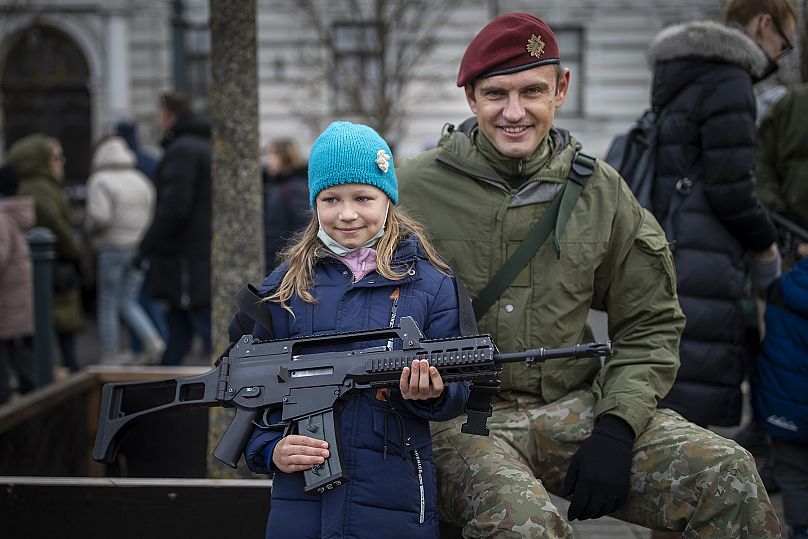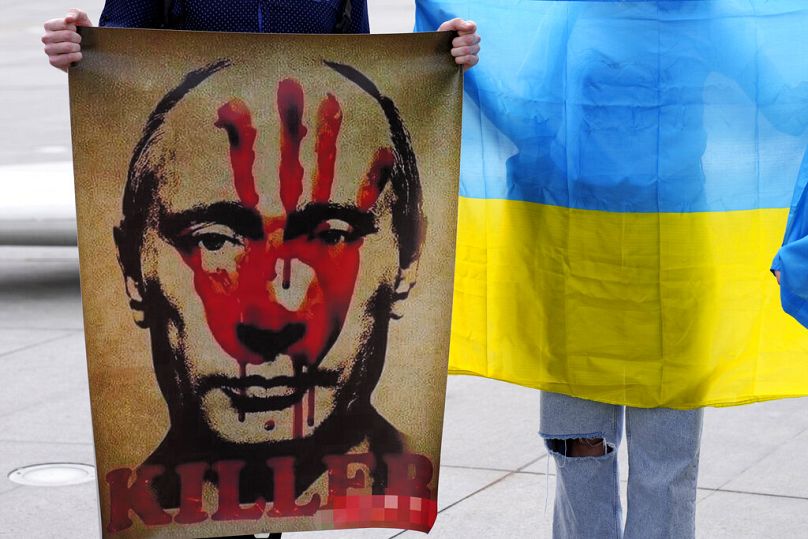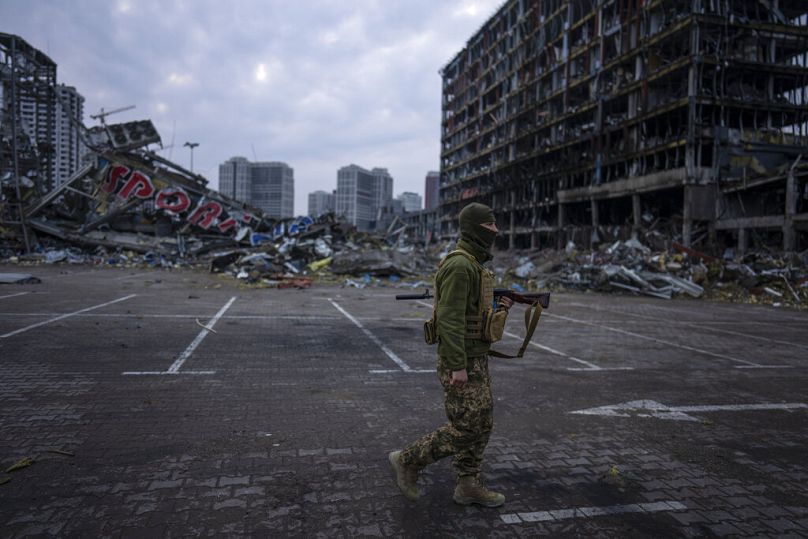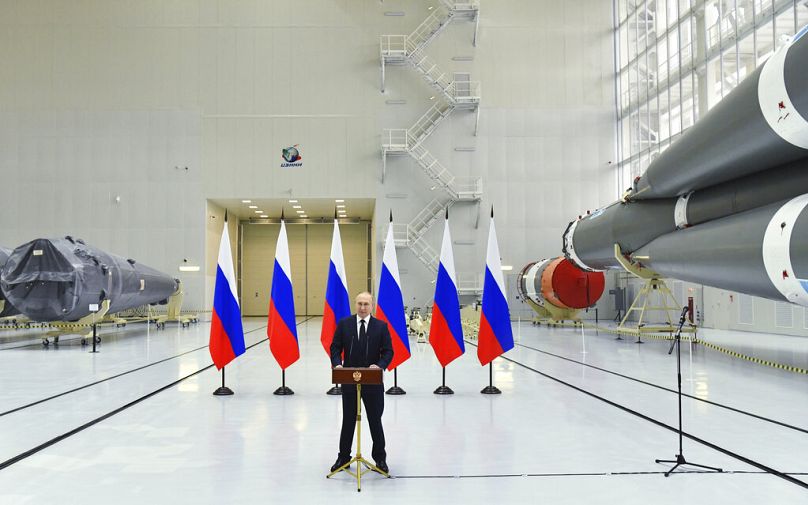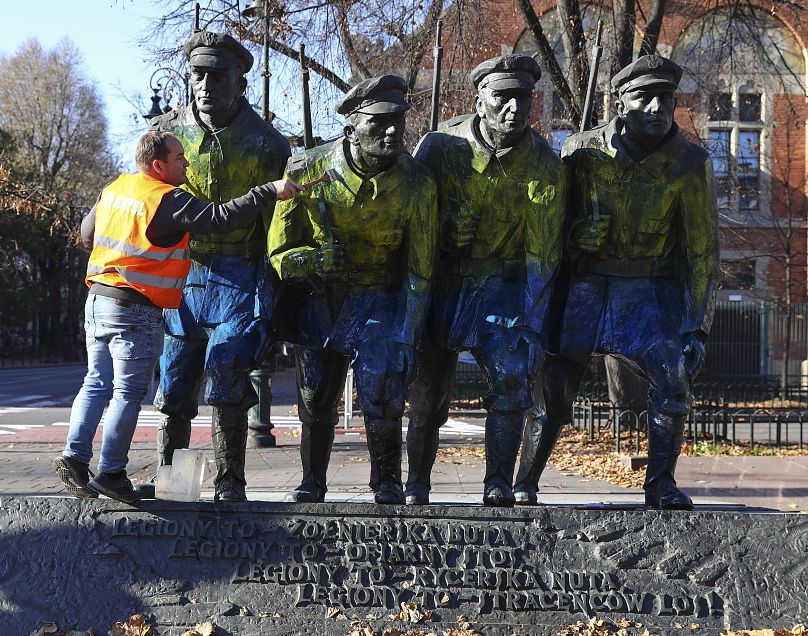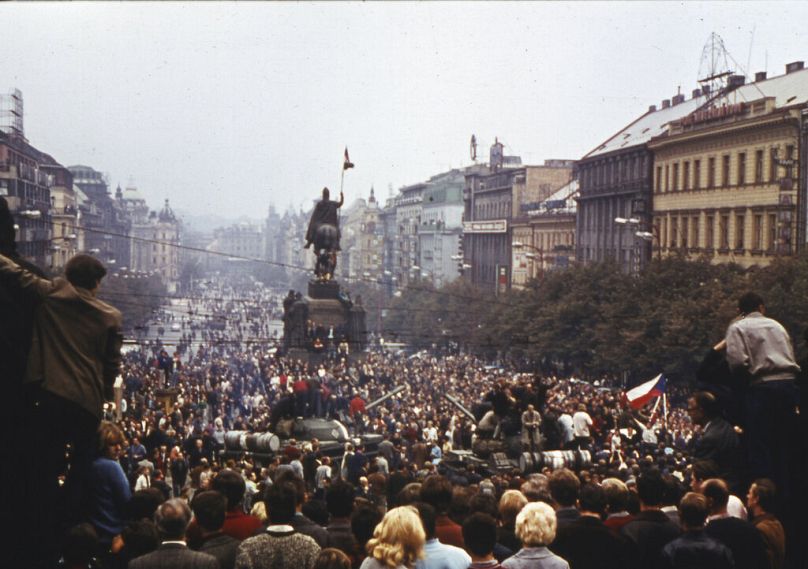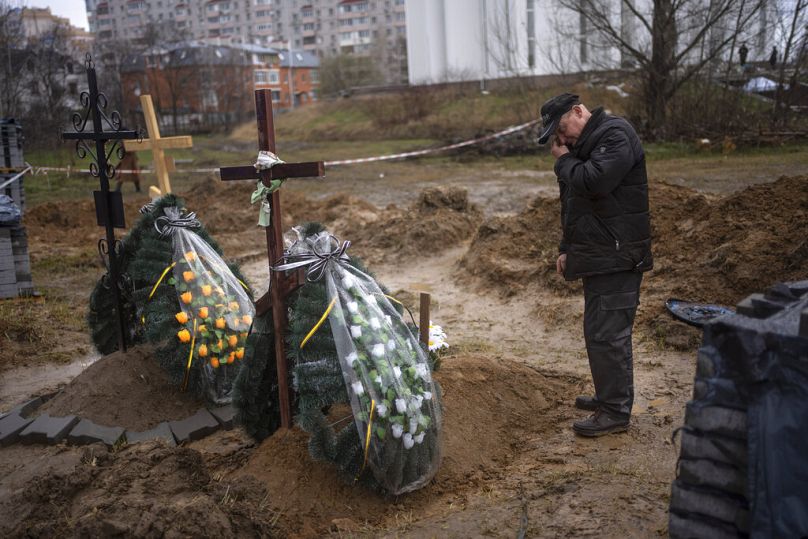Self-organised and nonfunded, groups of volunteers from the Baltics to Central Europe took on the task of combatting the Kremlin propaganda machine. Now, the war in Ukraine has them doubling their efforts.
When Moscow first invaded Ukraine in 2014, a group of volunteers in the small Baltic state of Lithuania, right on Russia’s doorstep, felt compelled to do something.
They decided to call themselves The Elves, evoking the benevolent mythical creatures who quietly hammer away behind the scenes.
Their leader, who speaks in a brusque and authoritative voice, goes by the pseudonym The Hawk. Most of them do not use their real names online to make it harder for Russian trolls to track them down.
The Hawk saw Lithuania — a former Soviet state that broke away some 30 years ago when socialism crumbled — as being particularly vulnerable to the Kremlin disinformation machine.
Wary of its neighbour, the less than three million-strong country joined the EU and NATO in 2004, enabling it to better shield itself from malign influence both militarily and politically.
But the 2014 war in Ukraine set off an unprecedented onslaught of disinformation targeting countries that did not toe the Moscow line.
“We had a feeling that a lot of troll farms started to work against Lithuania, spreading the usual lies: ‘NATO is an occupier, the EU is a failed project, and Lithuania is a failed country,’” he told Euronews.
So The Elves — all unpaid volunteers whose day jobs range from accountants to media or IT specialists — developed their own strategy to counter the threat.
Operating across nearly a dozen countries in Europe, they monitor fake pro-Kremlin profiles and pages on social media, particularly on Facebook, and debunk disinformation through simple explanations and even memes.
The goal is to keep the concerted efforts by Russian trolls to contaminate the online world at bay — or at least minimise its influence.
Content should be straightforward, making information accessible and understandable for broad swathes of the population.
“We do it on a level that is understandable to average people — we try to explain what the disinformation is. We fight against toxic trolls by trying to take them off social networks, and by reporting them in an organised way,” The Hawk said.
Mass reporting content or users was an internet security loophole trolls loved using to shut down accounts by journalists or free speech activists — one famous case is Finnish journalist Jessikka Aro, who became a victim of troll activity while reporting on Russian disinformation efforts.
Now The Elves are using the tools at their disposal to hit back.
Their reasoning, according to The Hawk, is simple: what matters is the truth, and there are no set rules on how it should be disseminated.
Fighting disinformation in a war launched by disinformation
Since the war began, the Lithuanian Elves actively took part in denial-of-service or DDOS attacks on Russian and Belarusian state institutions, propaganda outlets and infrastructure sites.
These attacks, which also saw participation by Anonymous, a notorious activist hacking group, knocked out access to websites ranging from private banks to RT and Sputnik and the Russian Ministry of Defence for days on end.
According to The Hawk, the fight taking place online is a way “to support our brothers in Ukraine”.
“This is additional motivation — to spread information about what is really going on, and to somehow reach Russia, to inform the Russian people that this is a real war, not a bloody ‘special operation’,” he said.
But the task is not simple, and it is an everyday struggle in Lithuania as well as the other 11 countries where The Elves now have a presence.
Ever since the Russian invasion began on 24 February, what used to be much more carefully crafted messaging from Moscow turned into an outright twisting of facts and the creation of conspiracy theories.
“Now they’re spreading absolutely crazy lies. They’re not even thinking about how to do it in a professional way, it’s just absolutely wild disinformation,” The Hawk stated.
“They are quite disorganised and quite desperate. But it doesn’t mean they’re not aggressive. They’re still investing a lot of money into disinformation and cyberattacks as well.”
Anonymous heroes
Aggressiveness and the accompanying sense of danger are the main reasons why the likes of The Hawk use a pseudonym to this day.
Even those outside of Elves’ circles, like Dmitri Teperik, chief executive of the International Centre for Defence and Security in Tallinn, had their brush with the aggressive pushback from pro-Russian voices.
“I remember from 2014 when the Crimea was occupied by Russia and the war in Donbas started,” Teperik recalled for Euronews, “we engaged many civilian activists in Estonia for Ukraine support, and also tried to eliminate Russian propaganda from our social media networks.”
“Myself and my colleagues were immediately intimidated, verbally attacked and labelled fascists by pro-Kremlin proxies and other agents of influence.
“So, the threat is real, and the best we can do is be very cautious and discern the trolls among us, what their activities and goals are,” he said.
While in Lithuania The Elves might be more directed towards the sources of disinformation themselves, Estonian fighters against Kremlin propaganda are keener on understanding and approaching those who are “informationally vulnerable”.
“In Estonia, we mostly pay attention to those groups within our society whose media consumption patterns are different from the mainstream, so sometimes we are talking about the local Russian communities, but during the corona crisis, there were people who are anti-vaccination activists and so on,” Teperik explains.
Estonia, too, shares a border with Russia, and for decades since the country’s independence, many in the country felt they were under direct threat from Moscow.
The global interest sparked by the latest invasion of Ukraine has finally legitimised those who have been long warning the rest of the continent and the world about the dangers of Vladimir Putin.
Yet they feel only somewhat vindicated, given the human cost it took for others to finally start paying attention, Teperik argues.
“Of course, they missed our warnings and the signals we’ve been sending starting from 2007-08 and then 2014.”
“Now we see that the understanding of Russia’s aggressiveness is getting broader, but there’s still some kind of naive hope among Western politicians in Germany, France and the US that maybe Putin can be convinced to stand back away from Ukraine and they can continue with the business as usual.”
“The very harsh decision must be made already now in order to secure the EU and NATO, but also in order to help countries like Ukraine, Moldova or Georgia not to be attacked by aggressive Russia,” Teperik concluded.
Trolls also target Russia’s ‘near abroad’ in Central Europe
Even countries that are not in Russia’s immediate vicinity have Moscow’s effect on creating confusion about what is real and what is not, but also strengthening support for Putin-friendly politicians.
Bohumil Kartous, the spokesperson for the Czech Elves and CEO of the Prague Innovation Institute, says that the domestic pro-Kremlin groups mostly focused on promoting Czech populist political parties, particularly SPD and the Communist Party.
But the war made them shift their focus on discrediting the politicians in power instead.
“Now, after the war exploded, a mixture of blended narratives is emitted into the digital space,” Kartous explained to Euronews.
“Some of them are copying Kremlin propaganda, as usual, but some of them try to discredit and diminish the stance of the Czech government which is strongly pro-Ukrainian.”
“Some even attack the goodwill to help refugees with an emotional appeal to ‘what about our [Czech] people in need,’” Kartous said.
But according to the latest polls, it seems these attempts have had almost no impact, with the Czech public continuing to be firmly in favour of helping Ukraine and its refugees.
Yet Kartous and the Czech Elves, who monitor and analyse known disinformation-peddling websites and a number of pro-Kremlin groups and pages on Facebook, believe the tide in public support might turn as the war goes on.
“Things could change if the aggression lasts a long time and people are constantly exposed to doubts about increased expenditure and reasoning along the lines of ‘why should we help those people.’”
“That’s why we believe it’s necessary to take on sources of disinformation similar to shutting down Kremlin amplifiers Sputnik and RT,” Kartous said.
Why believe The Elves?
Neighbouring Slovakia, which together with the Czech Republic constituted Czechoslovakia, a Soviet satellite state that broke away and peacefully split up in 1993, also has its batch of Elves.
Tomáš Kriššák, a cognitive security expert and member of the board of advisors of the Central European Digital Media Observatory, says that for many years he felt alone in pointing out Moscow’s malign interference in a society where the support for Russia is split into two equal parts.
“I have worked in this field for 12 years and most of the time I felt really desperate. I felt there was no meaning and no sense to do this because everybody thought we were just making this up,” Kriššák told Euronews.
“But when I met The Hawk, I understood that there are more people like me, that there are more people who are actually aware of this issue, and we started to form a network, which is also important when you don’t want to feel alone and crazy.”
Although each country is different, and Russian disinformation makes sure to isolate the specific entry points for disinformation on a country by country basis, some of the disinformation patterns are the same, Kriššák believes.
“Lots of people are bandwagoning with Putin, just repeating the lies and I’d say criminal apologies of what is happening in Ukraine.”
“They started in 2012 with fringe media that created conspiracy theories. That helped create a decentralised movement, but in 2014 after the first invasion of Ukraine, they really stepped up their game,” he said.
Similarly to the Czech Republic, the Kremlin disinformation actors in Slovakia were mainly focused on inspiring those Slovakians unhappy with the direction their country was headed in by creating an interest in having a relationship with Russia.
This included politicians but also NGOs, academics and even students, Kriššák said, invoking data gathered by the domestic NGO Gerulata, which has been monitoring Moscow’s activities in the country for years.
But after the February invasion, they used Facebook pages with tens of thousands of followers to become more focused on creating an “information chaos” and manufacturing false narratives regarding what the Russian troops were doing in Ukraine.
“When they bombed a hospital or a theatre filled with civilians [in Mariupol], they simply said they were bombing Azov soldiers hiding in the place.”
The Azov Regiment is a controversial far-right Ukrainian military unit that is part of the country's National Guard and features prominently in Russian propaganda.
“They’re trying to depict themselves as ‘the good guys who are just denazifying the country’ and investing a lot of energy in character assassinations of [Ukrainian] President [Volodymyr] Zelenskyy who they depict as a loser, a junky, a bad actor, you name it. That’s what they do.”
For Kriššák, the Kremlin’s efforts to affect public opinion in Slovakia is a continuation of Russia’s obsession with maintaining influence in the area post-1968, the year in which the Soviet Union invaded the country, sending its tanks to Prague to violently quash efforts to liberalise Czechoslovakia’s communist system.
Czechoslovak activists and protesters at the time were fighting against pro-Soviet propaganda that the secret police used to keep control over the public sphere.
“The secret police were diligently poisoning the minds of Slovaks for many, many years, and Slovaks in a way are a really cynical nation — they are not sceptical, they are cynical — and cynicism is still misused by propaganda to actually persuade people that everyone is lying,” he concluded.
Disinformation – cheap, effective and consistently underestimated
Ross Burley, the cofounder and executive director of Centre for Information Resilience, the UK’s leading non-profit dedicated to countering disinformation, told Euronews that the 21st century has made disinformation a very cheap and effective weapon.
“Often the simplest disinformation campaigns are the most effective, as well as the ones that draw on a kernel of truth and then run with it. The idea is to introduce doubt and confuse,” Burley explained.
Moscow’s claims that US-funded biological laboratories in Ukraine are being used to produce bioweapons — another in the line of justifications for the war — is a good example of this, according to Burley.
“It’s something that’s in the public consciousness post-covid, but also there is a kernel of truth. There were laboratories, some of which have received US funding. Now, the aim of these laboratories was not to develop biological weapons, obviously.”
“But it’s just about introducing doubt and making it appealing to readers in a way. There’s an instructiveness to conspiracies, having that insider information, that kind of feeling that you’re uncovering something. All of those things are very human, and they tap into that very, very well,” he illustrated.
Countering propaganda requires the most skilled and not necessarily the most established figures like prominent journalists or politicians — something that The Elves tapped into early on, Burley explained.
“Certainly back when they started doing it in 2014, no one else was doing anything else on this scale,” Burley said. “This kind of nebulous model that The Elves had of little cells and individuals working together was incredibly effective.”
When the various Western governments began to think about how to utilise civil society actors to try and counter disinformation, they were only willing to work with existing organisations and companies, Burley pointed out.
“And you could have a guy who is in his mother’s basement or whatever who is an absolute genius at this stuff, but wasn’t being engaged with.”
“Whereas the Elves model was to get the best people, the most committed people, and bring them all together in a much more collegiate and systematic way,” he explained.
Now, the Elves' long-term value and ability to keep on fighting will depend on protecting themselves from threats from both the outside and the inside.
“You obviously have to be careful with the human intelligence factor and there might be people trying to infiltrate and that’s the biggest danger,” Burley said.
“If you welcome everybody with open arms, you could be walking the wolf into the sheep pen, or a fox into the chicken coop.”












